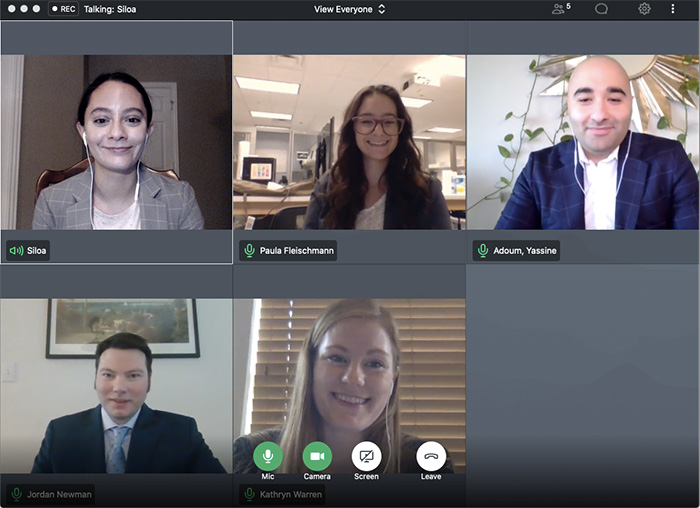Geosciences Team Goes the Distance To Reach Imperial Barrel Award Contest Finals
By: Stephen Fontenot | April 29, 2020
A quintet of graduate students from The University of Texas at Dallas’ Department of Geosciences has won the Southwest Section of the Imperial Barrel Award (IBA) competition, an annual event sponsored by the American Association of Petroleum Geologists.
With the win, the team advances to the global finals in June.

The team — comprising Yassine Adoum, Paula Fleischmann, Jordan Newman, Kathryn Warren and Siloa Willis — defeated Texas Tech University and Texas Christian University to claim one of 12 spots in the international test of oil and gas exploration acumen.
Competing teams spend eight weeks analyzing real-world data supplied by organizers to determine a given region’s viability for oil and gas and the ideal locations for drilling. The target site for the sectional event was a region of the North Sea off the west shore of Denmark.
“The competition gives you hands-on experience performing tasks that you would have to perform in a real industry job,” Willis said. “You learn a lot about the field of petroleum geology and geophysics, and you also learn more practical skills: time management, delegation of duties and working with a group of diverse people.”
The UT Dallas group prepared for the competition with the help of two faculty advisors from the School of Natural Sciences and Mathematics — Dr. Mortaza Pirouz, assistant professor of instruction in geosciences, and Dr. Robert Stern, professor of geosciences — as well as an industry advisor, geologist Robert Webster. The event, held March 28, occurred online instead of in person due to the COVID-19 pandemic.
“The Imperial Barrel Award competition not only gives UT Dallas geosciences students the chance to learn more about the science of oil exploration, it also immerses them in a very intense team-building exercise,” Stern said. “Being on an IBA team is a once-in-a-lifetime opportunity that strengthens student resumes at the same time that it gives them an experience that they will never forget — especially if they win their division, as the UTD team did this year.”
Participation in the IBA competition was offered as a three-credit-hour class, which Pirouz said allowed the students to devote more time and focus to the project.
“The Imperial Barrel Award competition not only gives UT Dallas geosciences students the chance to learn more about the science of oil exploration, it also immerses them in a very intense team-building exercise. Being on an IBA team is a once-in-a-lifetime opportunity that strengthens student resumes at the same time that it gives them an experience that they will never forget.”
Dr. Robert Stern, professor of geosciences
“Professor John Geissman, the head of the department, strongly supported this effort as the team prepared,” Pirouz said. “Dr. Stern and Dr. David Lumley [the Cecil H. and Ida M. Green Chair in Geophysics] and industry advisor Bob Webster, helped guide the student effort. UTD lecturer Lowell Waite also gave excellent constructive feedback and encouragement. Many people played significant roles in making this a success.”
Each team’s proposed drill sites are put forth in a 25-minute presentation to a panel of industry experts who judge them based on technical quality, clarity and originality.
“It has been a fantastic experience,” Willis said. “It’s given me a lot of technical and transferable skills that I know I’ll use moving forward.”
The team was not able to meet in person for the last two weeks leading up to the competition due to the pandemic, so they relied on video meetings and emails to work as a team.
“The competition alone is extremely stressful — we have to do a job that in the real world would take up to six months, and we have only eight weeks,” Willis said. “Add on a pandemic and some technical limitations, and the pressure was insane.
“We truly could not have done this without our advisors. This was Dr. Pirouz’s first time as a faculty advisor for IBA, and he did a fantastic job.”
This is the seventh year that UT Dallas has participated in the association’s IBA competition and the second time in four years that the Comets have advanced to the finals. In June they will compete against 11 other section winners from all over the world.
Media Contact: Stephen Fontenot, UT Dallas, 972-883-4405, stephen.fontenot@utdallas.edu, or the Office of Media Relations, UT Dallas, (972) 883-2155, newscenter@utdallas.edu.





